FG inaugurates the sub-national food system’s dashboard for policy actions.
On Thursday, the Federal Government launched the Sub-National Food Systems Dashboard to inform policy decisions and track the food system reform agenda for national growth.
During the occasion in Abuja, Sen. Sabi Aliyu-Abdullahi, Minister of State for Agriculture and Food Security, stated that the dashboard would aid in the transformation of Nigeria’s food system in each state.
Aliyu-Abdullahi went on to say that the dashboard would also provide insights and prioritise actions for stakeholders.
“The dashboard is more than just a data repository; it is a catalyst for positive change because it is intended to guide Nigerian policymakers and businesses at both the national and subnational levels, ensuring informed decisions that will improve our food systems and empower civil societies to hold various actors accountable.”The dashboard will also provide a single data source for researchers both inside and outside of Nigeria to perform more studies that will increase the evidence required for future policy decisions.
“Furthermore, this dashboard will serve as a platform for fostering collaboration and synergy between the various components of the food system,” he explained.
The dashboard, according to the minister, was linked to the global food system dashboard and examined data for the public and private sectors both in the country and abroad.
He went on to say that the dashboard contains 99 indicators that were rigorously identified and inspected in order to provide a comprehensive view of Nigeria’s food system at all levels.
“Based on a detailed analysis of the data collected by the dashboard, it provides a list of suggested policy actions and judgements for each state.
“These actions have the potential to improve food systems and advance national development efforts,” he continues.
According to him, the government has already created a food system profile for some states.
This, he said, will be useful in advocacy efforts to involve key decision-makers in Nigeria’s food system overhaul.
He added that the move would also create a map of growing commercial prospects and prospective investment sectors in food system reform.
He stated that the cost and affordability of health diet and diet polity, which are essential metrics from the dashboard, had been implemented to improve nutrition and food security in the country.
Dr. Michael Ojo, Country Director, Global Alliance for Improved Nutrition (GAIN) Nigeria, stated in his remarks that the dashboard would give the necessary evidence to inform food security policies and decision-making.
Ojo praised the Federal Government for prioritising food and nutrition security, including declaring a food security state of emergency.
The dashboard, he said, is “critical evidence-based policy” for overhauling the food system.
“Business leaders and entrepreneurs can identify investment opportunities, see business innovations as more than technological innovations, and improve financing mechanisms.
“The dashboard will provide data for baseline studies and reports for the government, policy analysts, statistical organisations, and assistance partners.
“It will assist policymakers in identifying and prioritising interventions required to achieve the right level of impact in transforming the country’s food systems while not disrupting the dynamics of Nigerian markets,” he added.
In addition, he stated that researchers, professors, and students will have easy access to full data in order to uncover and study insights and emerging trends in the country’s food system.




